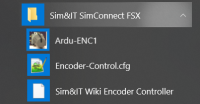Benutzer-Werkzeuge
Inhaltsverzeichnis
SimConnect Client
System description
→ How a client can be started together with FSX/P3D is described in the HowTo SimConnect-Client Autostart.
The SimConnect-SDK implements the access to the simulator and commands can be generated via the Event-IDs. So it is possible with a SimConnect client to send commands to the flight simulator FSX or P3D with external hardware
The SimConnect client communicates directly with the hardware via the UDP network protocol.
System requirements
The SimConnect client can be used with FSX-SP2 and P3D. A working network with automatic address allocation (DHCP) is required to assign a valid IP address to the Arduino. This is done, for example, via the router that implements the Internet connection.
The SimConnect clients can be started directly from the installation folder.
The default location of the configuration files of the SimConnect clients is:
Win7 ff: C:\Users\username\AppData\Roaming\Sim&IT\SimConnect
This folder is hidden by default.
The configuration file Encoder-Controller.cfg can also be located in the installation folder, which is then preferably used.
The configuration file can be displayed and edited with the editor (Programs → Accessories), for example. A corresponding link to the configuration file is created in the program folder during installation.
There is also the possibility to setup the automatic start of the SimConnect clients with the flight simulator.
Note: If the SimConnect clients on your system start with an error message, then the current runtime libraries for the program environment must be installed on your system. These can be found in the Microsoft Downloads.
Microsoft Visual C++ Redistributable Packages
Software-Installation
After starting the setup, you can change the destination folder of the installation and the menu folder of the program group. Click „Finish“ to complete the client installation.

After installation, you will find the links to the client programs and to the configuration file for changing the configuration variables of the clients in the program group Sim&IT SimConnect, which was preferably specified during installation.
Client Configuration
Configuration Variables
The configuration variables are followed by a = and then the value to be set.
For all modules there is the section [NET] with the configuration variable
INTERFACE_INDEXfor defining the network adapter if there are several in the system- use the program
Show the Netindexor the following command wmic nicconfig where IPEnabled=true get caption,index, interfaceindex, ipaddress
Configuration of Encoder Controller
For the encoder controller there is the section [ENC1]
In section [ENC1] there are the following variables:
ARDU_PORTto define the port of the receiving device, if standard port cannot be usedRECV_PORTto define the port on the PC, if standard port cannot be used
The changed ports must also be defined in the Arduino sketch.
LICENCE_NAMEfor license nameLICENCE_NUMBERfor license number
The client works without license for about 10 minutes.
For each encoder (1 to 6) there are configuration settings to define functions other than the predefined functions according to the String Names of the Event-IDs from SDK help (example for Encoder1):
ROTARY1_EVENT_RIGHTCommand for clockwise directionROTARY1_EVENT_LEFTCommand for counterclockwise directionROTARY1_EVENT_PBcommand when pressing the encoder axis (Push Button)ROTARY1_EVENT_PB_HOLDcommand when pressing the encoder axis for a longer time
There is an additional function for the encoder6. If the option
ROTARY6_PUSH_TO_ACTIVATE
is set to 1, then the encoder is only activated after pressing once.
There are also two individual keys 7 and 8 with the configuration variables (exemplary for key7).
KEY7_EVENTcommand when pressing the keyKEY7_EVENT_HOLDcommand when pressing the key for a longer time
Configuration of Port Extention for Switches
The configuration of the switches is described in the section Extensions.
